Want to Be Green Despite the Big Freeze? I Asked HVAC Experts if It Is Better to Leave Heating on All Day — They Had These Warnings
Want to heat your home and be eco-friendly? These pro tips will save energy (and cut bills)
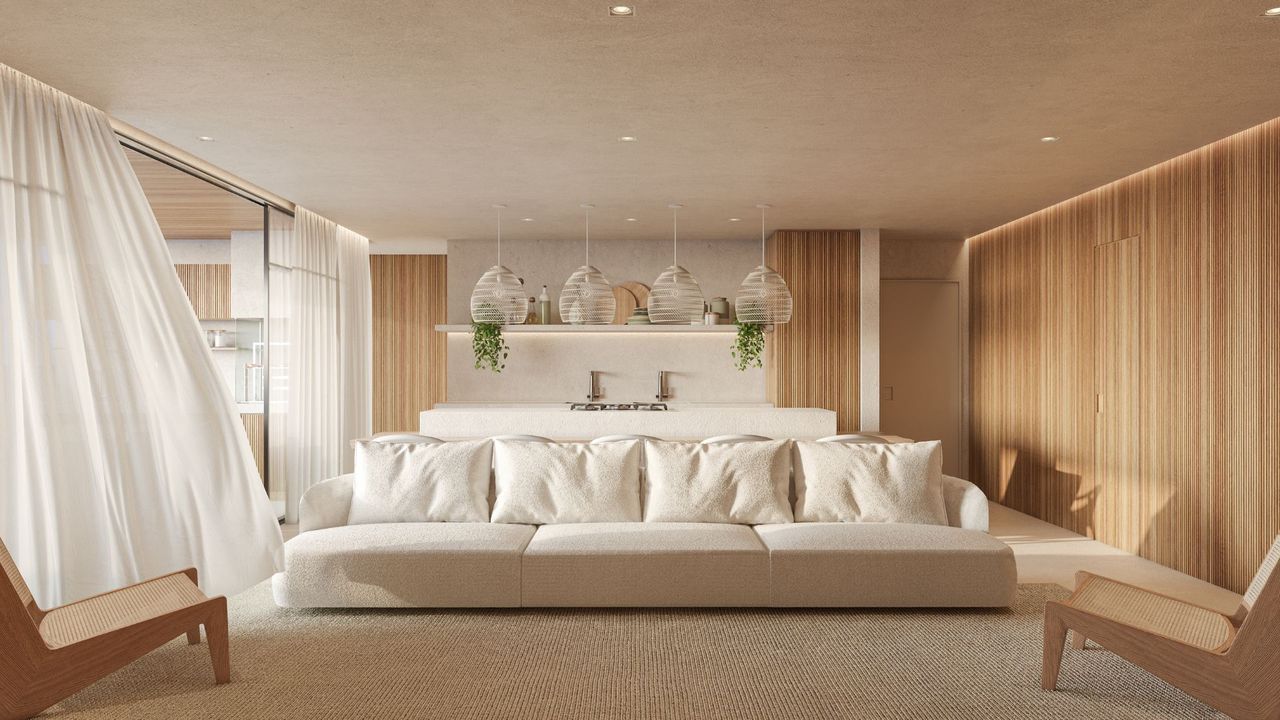

As the temperatures continue to plummet in some parts of the country, many of us are keen to cozy up by running the heating all day and night.
But if you are considering leaving your central heating on constantly and considering your winter thermostat setting alongside it, take note of HVAC expert warnings against doing so as, they say, it can lead to a big surge in energy usage (and, of course, bills). So, what is the best way to run central heating?
I spoke to HVAC professionals to find out.
Is It Better to Leave Your Heating On All Day?
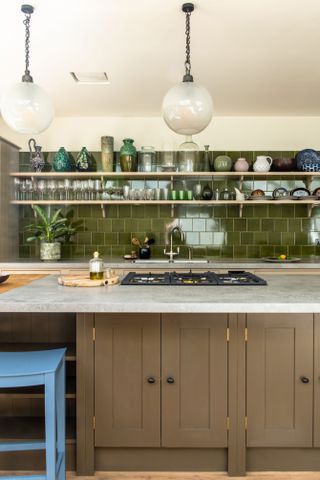
Despite what you might think, leaving your heating system on all day could be a problem if you're attempting to conserve energy at home, according to HVAC experts.
Alex Atkinson, HVAC Expert at Super Brothers, tells us that "Many people believe it is cheaper to leave the heating on all day, as it saves the big surge of energy required to turn it on and off. In most cases, that's just not true."
Alex says when you heat your home all day, "the system works to maintain a consistent temperature throughout, even when you don't need it to. This could result in higher energy consumption over time, especially if your home is not well insulated."
Keith Wortsmith, HVAC expert and President of DASH Heating, Cooling & Plumbing, says intermittent heating is preferable. "Intermittent heating is more economical than leaving your heating on all day," says Keith. "However, if you’re home all day, leave your heating on and let the system cycle on and off automatically to maintain a steady temperature." You can invest in a smart heating system and use timers and sensors to save on energy bills, too.
Why Is It Not Cheaper?
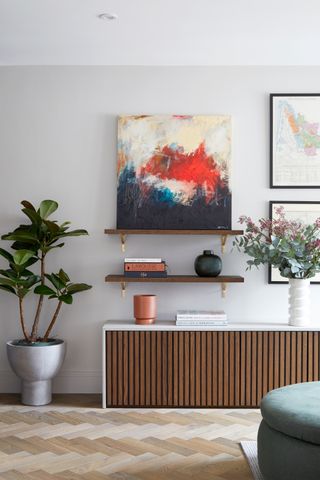
Whether you're looking for the best way to heat a garage or simply want to keep your living room space warm during the frost — keeping the heating on all day might just consume extra energy and money.
"Leaving your heating on all day is rarely cost-effective," explains Erika Friedrich, HVAC expert from A-Temp Heating and Cooling. "Heating systems are designed to work efficiently in cycles, meaning they heat your home quickly and then shut off until needed again. By leaving your system running continuously, you're forcing it to maintain a steady temperature, which wastes energy over time. Instead, schedule your heating to turn on only when you need it — this approach aligns with how your system is built to perform optimally."
Erika says this is, therefore, not a cheaper option due to energy loss, as homes tend to lose heat through walls, windows, doors, and even the roof. "If your heating is on all day, your boiler or heat pump has to counteract that loss continuously," adds Erika. "The energy used to maintain a set temperature all day is often greater than the energy used to heat your home for shorter periods when required."
And HVAC expert Alex seems to agree. "It's not cheaper because the energy is still used constantly to replace the heat escaping your home throughout the day," he notes. "Even turning it down a little, the system still needs to work to maintain that lowered temperature." The expert says you should only heat when it is necessary as this allows the system to work more efficiently and not waste energy during periods when the house is empty.
When Is It Better to Leave Heating On All Day?
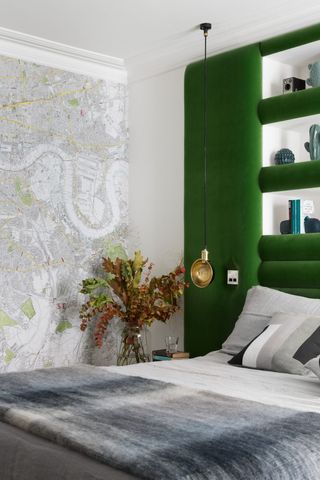
Depending on the type of heating you have in your home, Erika says "It might be cheaper to leave the heating on during specific times of the day if energy rates vary, such as during off-peak hours in the early morning or late at night when electricity or gas prices are lower."
She continues: "This approach can work well if your utility provider offers time-of-use rates. However, for most homes, it’s still better to use a programmable thermostat to heat your home only when needed." We recommend using the Google Nest Thermostat Smart Thermostat from Amazon or the Honeywell Home Programmable Thermostat.
"Leaving the heating on all day might be cheaper in very specific scenarios, like in a well-insulated home with very low heat loss," explains Alex. "Here, keeping the temperature consistent might be less consuming than having to heat up a cold house several times over."
According to Alex most houses, however, lose heat through walls, windows, and doors, "this means the heating has to compensate regularly. In such a case, it's worth investing money in insulation and draft-proofing." A smart and easy way to make your house feel a lot warmer if you ask us.
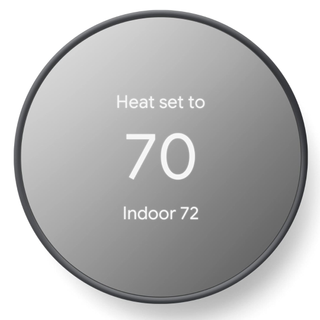
Price: $104
Was: $129.99
Chic, stylish, and easy to use, this charcoal smart thermostat will help you save energy while granting you comfort. The Google Nest has also been designed to turn itself down when you leave your home in order to save energy.
The programmable thermostat also lets you create a schedule via the Google Home app on your mobile. It also features a Smart thermostat with HVAC monitoring, a savings finder, control Nest, and so much more. Stacking over 8,000 reviews and 4.2 stars out of 5, one buyer says they love the temperature control function feature. "Great product. I can schedule the temperature for my office even when I'm not physically there," writes the buyer.
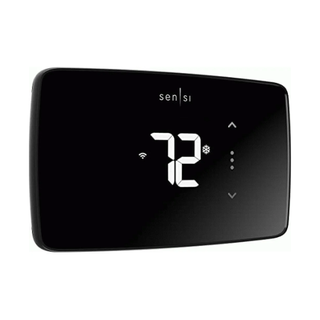
Price: $78
Was: $89.99
Easy to install and use, this Emerson Sensi Lite Smart Programmable Thermostat works with HVAC equipment found in most homes and claims to save around 23% of energy. It features a flexible scheduling system and can also be controlled from anywhere with the Sensi mobile app.
Customers also love this device as it's now received over 70 reviews and a 4.5 star out of 5. "This is one of the best thermostats for the money! The fact that it does geofencing at this price is amazing! Highly recommend. Very easy to install," reads one review. Another says: "No c wire necessary for most installations, which is a big plus for older systems and wiring. I got a deal on this thermostat with our energy provider. I installed it about a month ago. I am very impressed with this little thermostat. Very simple and straight forward no frills."
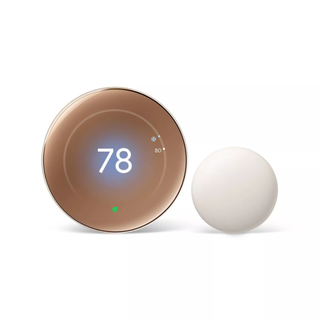
Price: $279.99
I love this little Google Next Learning Thermostat from Target. It's elegant in design and can brilliantly help you save energy in your home. It can learn the home temperature you like and adjust accordingly.
Featuring an Adaptive Eco so you can save energy when you're away and a smart sensor. It's also easy to install, and customers are currently loving this handy thermostat. Gathering a 4.9 out of 5 stars on the site, one happy shopper writes: "Absolutely love this nest thermostat! I had the Generation 2 model, and it worked great. I am so happy to have been upgraded to this model because it looks absolutely stunning."
What Is the Most Eco-Friendly Way to Run Your Central Heating?
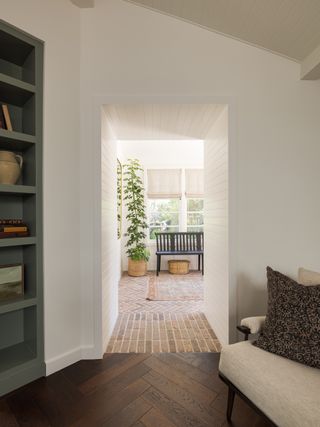
HVAC expert Keith says the most economical way to run central heating would be to do the following:
Set your thermostat: "Set your thermostat to 18°C when home and 16°C at night or when you’re away," he says. "Adding 2 degrees for extra comfort is fine, but every degree beyond that will unnecessarily increase your heating bills by around 10%."
Smart thermostats: Wondering if you should invest in a smart thermostat? This HVAC expert says it's worth it! "Smart thermostats know better when to lower or raise the temperature, saving you from the hassle of always remembering to adjust it," explains Keith. "As a result, you avoid heating or cooling your home when it’s not needed and lower your energy bills. While smart thermostats are perfect for people with irregular schedules, people with fixed schedules will be satisfied with just a regular programmable thermostat. But I have to admit that energy savings are more noticeable with a smart thermostat as there's nobody who always forgets to lower the temperature when going to bed or leaving home."
Draft-proof windows and doors: Lastly, "Sealing your windows and doors is key, as it directly affects how quickly your home gets cold after the heating is off, how often your heating cycles on and off, and how soon its parts may wear out."
FAQs
Does it cost more to keep turning heating on and off?
Put simply, our HVAC experts say it does not cost more. "No, it’s a myth that turning your heating on and off costs more, " explains Erika. "Modern boilers and heating systems are designed to heat your home efficiently when needed. Frequent reheating only uses energy when required, unlike leaving the heating on continuously, which burns fuel unnecessarily to maintain a constant temperature."
And Keith seems to agree, "It’s a myth that turning heating on and off costs more than running it constantly, even at a lower setting. Modern systems are efficient and don’t use extra energy to reheat a cold home."
It's clear from the experts that leaving your heating on all day might not be the best idea, so ensure you follow their expert advice, and you'll save on energy and bills in no time.
Now that you understand the fundamentals of heating, it's important to learn how to winterize your home correctly and prepare yourself for the weather changes that are happening. From sealing windows to insulating the home — there are a few ways to save on energy in the long run, why don't you give it a go?
Be The First To Know
The Livingetc newsletter is your shortcut to the now and the next in home design. Subscribe today to receive a stunning free 200-page book of the best homes from around the world.

Faiza is the Renovation Editor at Livingetc. Faiza is currently renovating her small kitchen in her dainty apartment in London. Faiza previously worked for The Independent as a News Feature Writer, where she crafted lifestyle, entertainment, and news stories. She also worked as an Audience Editor for the newspaper for almost two years. Thriving in the busy newsroom, Faiza also spent her time crafting stories for Sky News as an SEO reporter, where she produced stories based on trending topics. Lifestyle and interior design is a space she has been interested in for quite some time, and as she blossoms in this field, she will continue to further her skills in design and gardening. Faiza has a background in SEO, social media, and reporting. Her passion for writing goes beyond her workm as she loves all things poetry and creative writing.
-
 This Strangely-Shaped Side-Sleeper Pillow Is Going Viral for Super-Charging Beauty Sleep — And Preventing Wrinkles
This Strangely-Shaped Side-Sleeper Pillow Is Going Viral for Super-Charging Beauty Sleep — And Preventing WrinklesThis silk-wrapped, ergonomically designed pillow is winning over wellness gurus — and its unusual shape might be the secret to waking up flawless
By Julia Demer Published
-
 McGee & Co’s Outdoor 2025 Collection Is Designed to Survive Whatever Life Throws at It — Yes, Even Red Wine
McGee & Co’s Outdoor 2025 Collection Is Designed to Survive Whatever Life Throws at It — Yes, Even Red WineSun, rain, working from home, and the occasional spilled glass? No problem. This outdoor collection makes an oasis out of everyday obstacles
By Julia Demer Published
-
 Houseplant Trends — What to Choose, and How to Style and Care for It in 2025
Houseplant Trends — What to Choose, and How to Style and Care for It in 2025According to plant experts, these are the seven houseplant trends to keep an eye out for this year
By Amiya Baratan Published
-
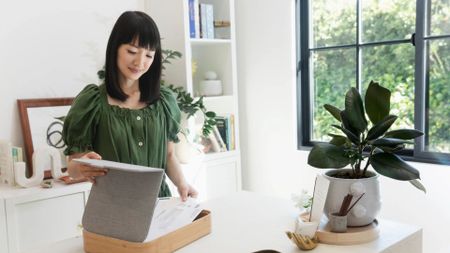 Marie Kondo's 5 Tricks for an Organized Entryway Helped Me Cut My Clutter — And Uncover the Value of Space
Marie Kondo's 5 Tricks for an Organized Entryway Helped Me Cut My Clutter — And Uncover the Value of SpaceKnown for her expertise in the field of decluttering and home organization, Marie Kondo's word is all we need to get our entryways sorted once and for all.
By Amiya Baratan Published
-
 The 'Decluttering Scavenger Hunt' Turns This Household Chore Into a Game (That You Could Totally Play With the Kids Today)
The 'Decluttering Scavenger Hunt' Turns This Household Chore Into a Game (That You Could Totally Play With the Kids Today)The 'gamification 'of decluttering might just make clearing your clutter more tolerable — this is a solution for all the task-averse
By Amiya Baratan Published
-
 This 'Strict' 50% Rule Will Help You Cut Your Home's Clutter in Half (Even If You're a Sentimentalist)
This 'Strict' 50% Rule Will Help You Cut Your Home's Clutter in Half (Even If You're a Sentimentalist)Is this rule strict? Maybe. Successful? Absolutely.
By Amiya Baratan Published
-
 How to Care for a ZZ Plant — Do This If You Want Lush, Green Foliage in Your Home
How to Care for a ZZ Plant — Do This If You Want Lush, Green Foliage in Your HomeFrom temperature to soil requirements, this expert guide holds all the information to care for this stylish houseplant successfully
By Amiya Baratan Published
-
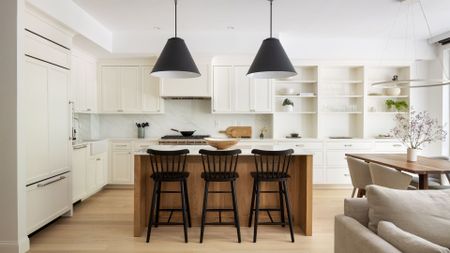 I'm Taking on This Decluttering Challenge for Lent — 40 Items to Say Goodbye to in 40 Days
I'm Taking on This Decluttering Challenge for Lent — 40 Items to Say Goodbye to in 40 DaysDuring lent, we recommend taking part in this decluttering challenge to pare back your home and have it Easter-ready. So here are 40 things to start with.
By Amiya Baratan Published
-
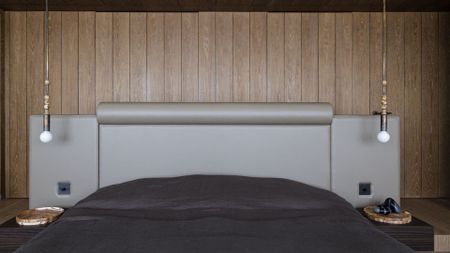 3 Things That Really Matter When Choosing Your Headboard If You Want a Bedroom With Good 'Energy'
3 Things That Really Matter When Choosing Your Headboard If You Want a Bedroom With Good 'Energy'When it comes to picking the perfect headboard, here are three key concepts to keep in mind for good Feng Shui
By Amiya Baratan Published
-
 9 Things You Can Do to Organize Your Dining Room That Will Make the Whole Space Work So Much Better
9 Things You Can Do to Organize Your Dining Room That Will Make the Whole Space Work So Much BetterThese nine expert-approved organization tips will take your dining room from messy to guest-ready in no time
By Amiya Baratan Published